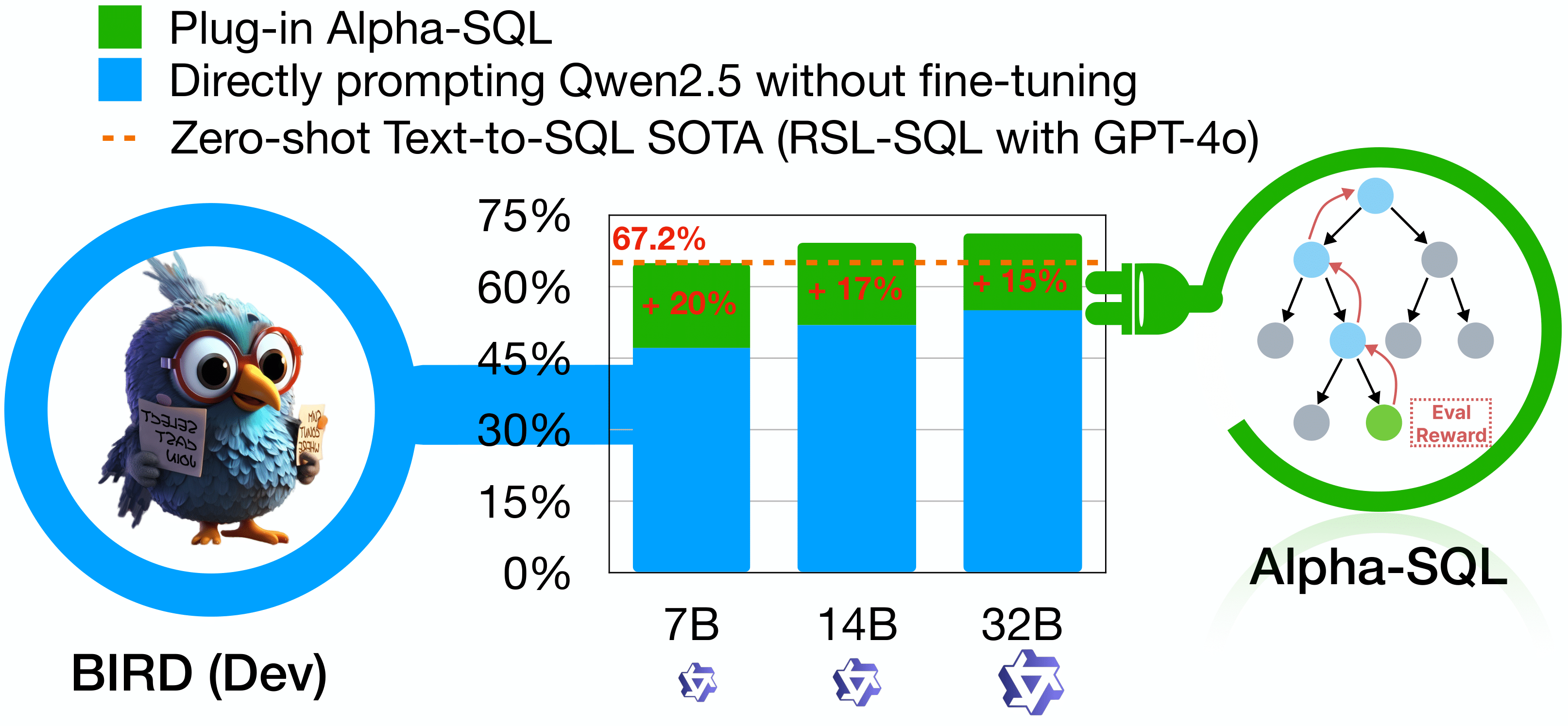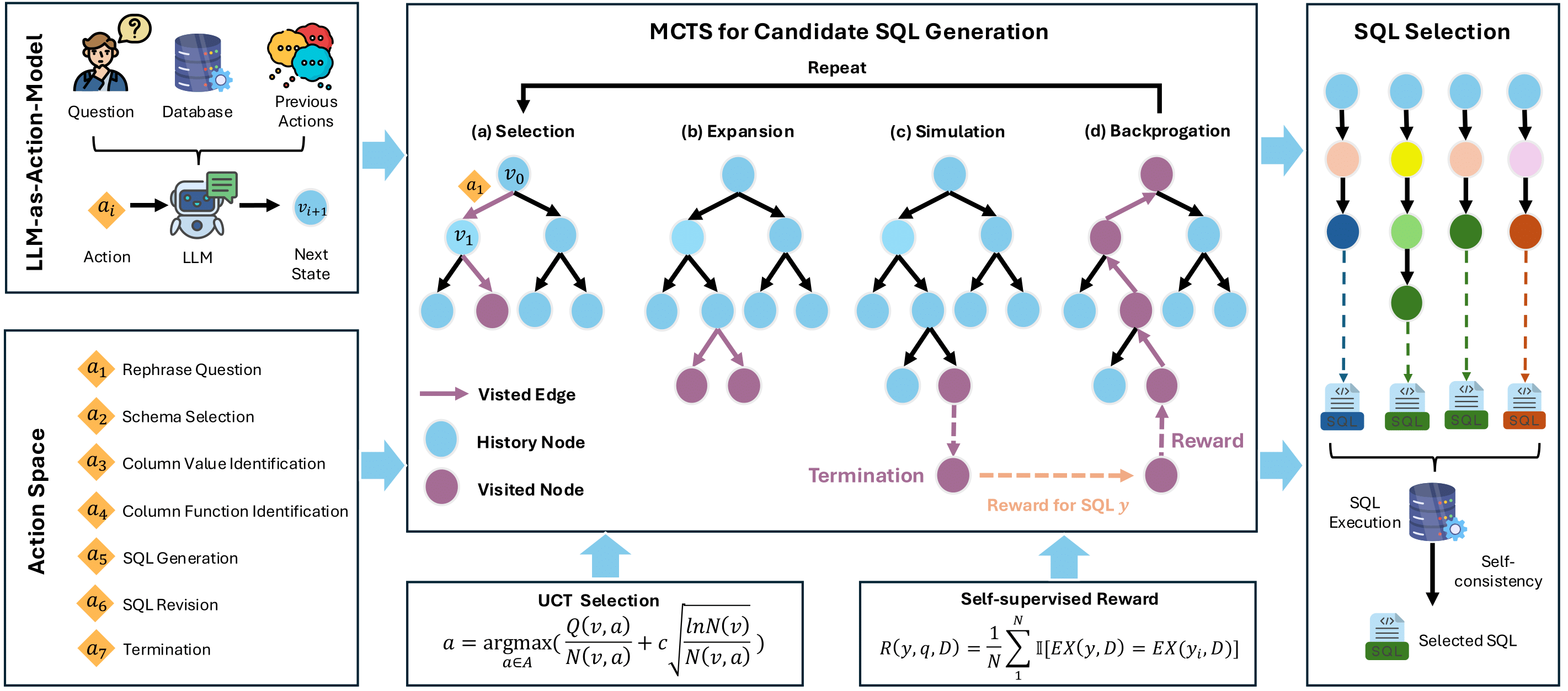Text-to-SQL, which enables natural language interaction with databases, serves as a pivotal method across diverse industries. With new, more powerful large language models (LLMs) emerging every few months, fine-tuning has become incredibly costly, labor-intensive, and error-prone. As an alternative, zero-shot Text-to-SQL, which leverages the growing knowledge and reasoning capabilities encoded in LLMs without task-specific fine-tuning, presents a promising and more challenging direction.
To address this challenge, we propose Alpha-SQL, a novel approach that leverages a Monte Carlo Tree Search (MCTS) framework to iteratively infer SQL construction actions based on partial SQL query states. To enhance the framework's reasoning capabilities, we introduce LLM-as-Action-Model to dynamically generate SQL construction actions during the MCTS process, steering the search toward more promising SQL queries. Moreover, Alpha-SQL employs a self-supervised reward function to evaluate the quality of candidate SQL queries, ensuring more accurate and efficient query generation.
AlphaSQL/
├── 📂 data/
│ └── 📂 bird/
│ └── 📂 dev/
│ ├── 📄 dev.json
│ └── 📂 dev_databases/
├── 📂 config/
│ ├── 📄 qwen7b_sds_exp.yaml
│ └── 📄 qwen32b_bird_dev.yaml
├── 📂 results/
│ └── 📄 dev_pred_sqls.json
├── 📂 script/
│ ├── 📄 preprocess.sh
│ ├── 📄 qwen32b_bird_dev_exp.sh
│ ├── 📄 qwen7b_sds_exp.sh
│ └── 📄 sql_selection.sh
├── 📂 alphasql/
│ ├── 📂 runner/
│ │ ├── 📄 preprocessor.py
│ │ ├── 📄 sql_selection.py
│ │ ├── 📄 mcts_runner.py
│ │ ├── 📄 selection_runner.py
│ │ └── 📄 task.py
│ ├── 📂 templates/
│ │ ├── 📄 schema_selection.txt
│ │ ├── 📄 sql_revision.txt
│ │ ├── 📄 sql_generation.txt
│ │ ├── 📄 raphrase_question.txt
│ │ ├── 📄 identify_column_functions.txt
│ │ ├── 📄 identify_column_values.txt
│ │ └── 📄 keywords_extraction.txt
│ ├── 📂 config/
│ │ └── 📄 mcts_config.py
│ ├── 📂 database/
│ │ ├── 📄 sql_execution.py
│ │ ├── 📄 utils.py
│ │ ├── 📄 sql_parse.py
│ │ ├── 📄 schema.py
│ │ ├── 📄 database_manager.py
│ │ └── 📄 lsh_index.py
│ ├── 📂 llm_call/
│ │ ├── 📄 cost_recoder.py
│ │ ├── 📄 openai_llm.py
│ │ └── 📄 prompt_factory.py
│ └── 📂 algorithm/
│ ├── 📂 selection/
│ │ └── 📄 utils.py
│ └── 📂 mcts/
│ ├── 📄 mcts_node.py
│ ├── 📄 mcts_action.py
│ ├── 📄 mcts.py
│ └── 📄 reward.py
├── 📄 README.md
├── 📄 requirements.txt
└── 📄 .env-
Download required resources:
- Bird dataset: Bird Official Website
-
Unzip the dataset to
data/birddirectoty following the project structure above.
-
AlphaSQL Env
conda create -n alphasql python=3.11 conda activate alphasql pip install -r requirements.txt
-
VLLM Env
conda create -n vllm python=3.12 -y conda activate vllm git clone https://github.com/vllm-project/vllm.git cd vllm pip install -e .
conda activate vllm
# For 4 GPUs
CUDA_VISIBLE_DEVICES=0,1,2,3 vllm serve Qwen/Qwen2.5-Coder-32B-Instruct --served-model-name Qwen/Qwen2.5-Coder-32B-Instruct --port 9999 -tp 4
# For 8 GPUs
CUDA_VISIBLE_DEVICES=0,1,2,3,4,5,6,7 vllm serve Qwen/Qwen2.5-Coder-32B-Instruct --served-model-name Qwen/Qwen2.5-Coder-32B-Instruct --port 9999 -tp 8conda activate alphasql- Modify
OPENAI_API_KEYandOPENAI_BASE_URLin.envfile (we need to accesstext-embedding-3-largemodel of OpenAI in preprocessing stage)OPENAI_API_KEY = "your-api-key" OPENAI_BASE_URL = "your-custom-endopoint" # If you use non-OPENAI services
- Run the following:
bash script/preprocess.sh
-
Modify
OPENAI_API_KEYandOPENAI_BASE_URLin.envfile (we need to accessQwen/Qwen2.5-Coder-32B-Instructmodel of VLLM delopyment)OPENAI_API_KEY="EMPTY" OPENAI_BASE_URL="http://0.0.0.0:9999/v1"
-
Run the following:
bash script/qwen32b_bird_dev_exp.sh
-
Run the following:
bash script/sql_selection.sh
-
The final
pred_sqls.jsonwill in the project root dir (defined inscript/sql_selection.shOUTPUT_PATH variable)
If you find our work useful or inspiring, please kindly cite:
@inproceedings{alpha-sql,
author = {Boyan Li and
Jiayi Zhang and
Ju Fan and
Yanwei Xu and
Chong Chen and
Nan Tang and
Yuyu Luo},
title = {Alpha-SQL: Zero-Shot Text-to-SQL using Monte Carlo Tree Search},
booktitle = {Forty-Second International Conference on Machine Learning, {ICML} 2025,
Vancouver, Canada, July 13-19, 2025},
publisher = {OpenReview.net},
year = {2025}
}






